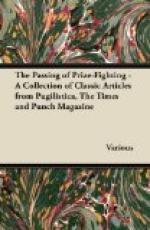[Illustration: MR. PUNCH GREETS HIS DOUBLE.
MR. FILDES OF STOCKPORT.]
The debate on the Civil Service Estimates furnished Mr. HOPKINS with an opportunity of delivering an appeal, doubtless cogent but mainly inaudible, for the restoration of the exchange value of the pound sterling. Mr. A.M. SAMUEL, on the other hand, was more audible than orthodox. At least it rather shocked me to be told that we were getting too much for the pound before the War. Mr. BALDWIN, for the Government, made a speech so full of sound commonsense that Sir FREDERICK BANBURY hoped he would send a special copy of it to San Remo for the edification of the PRIME MINISTER.
The rest of the evening was mainly taken up with the case of the Irish hunger-strikers. Mr. BONAR LAW was at first very stiff in his attitude, pointing out quite reasonably that if the Government found it necessary to intern people suspected of crime it was absurd to let them out again because they threatened to commit suicide. Several Members, English as well as Irish, thought that there was a case for differentiating between convicted prisoners and those who were merely under suspicion, and on the adjournment the Irish Attorney-General a little relieved the prevailing gloom by a hint that some modification of the prison-rules might be made on these lines.
Wednesday, April 14th.—The MINISTER OF HEALTH announced with some pride that under the Housing Acts passed last year no fewer than 1,346 dwellings had actually been completed, and twelve thousand more were in various stages of construction. But he showed no enthusiasm for the suggestion that be should extend the benefits of the Acts to others besides the “working classes,” and flatly declined to attempt a definition of that ambiguous term. It is believed, however, that recent experience has convinced him that builders in general and bricklayers in particular cannot properly be so described.
Mr. RENDALL’S attempt to get the House to pledge itself in advance to the full policy of Lord BUCKMASTER’S Divorce Bill was defeated. The main opposition came from Mr. RONALD MCNEILL, who sits for Canterbury and spoke with cathedral solemnity. Mr. MUNRO supported the Resolution, on the ground that Englishwomen ought not to be refused the advantages enjoyed by their Scotch sisters. Marriage in Scotland appears to resemble Glasgow—there are great facilities for getting away from it. But Lady ASTOR, hailing from a land where they are even greater, displayed no desire to jump to conclusions, and asked for an interval of five or ten years to make up her mind.
[Illustration: AN EX-ADMIRALTY CRICHTON.
DR. MACNAMARA EFFECTS A LABOUR EXCHANGE.]
If the cheers that greeted Mr. MACPHERSON were meant to console him for his “Irishman’s rise” in slipping down from the Chief Secretaryship to the Ministry of Pensions, they were assuredly superfluous. The supposed victim was obviously delighted to be rid of the responsibility for a policy which seems to grow more tangled every day. Only on Tuesday Mr. BONAR LAW was assuring the House that the Mountjoy hunger-strikers must be left to commit suicide if they chose; the Government could not release men suspected of grave crimes. This afternoon he announced that sixty-six of them had in fact been liberated on parole.




